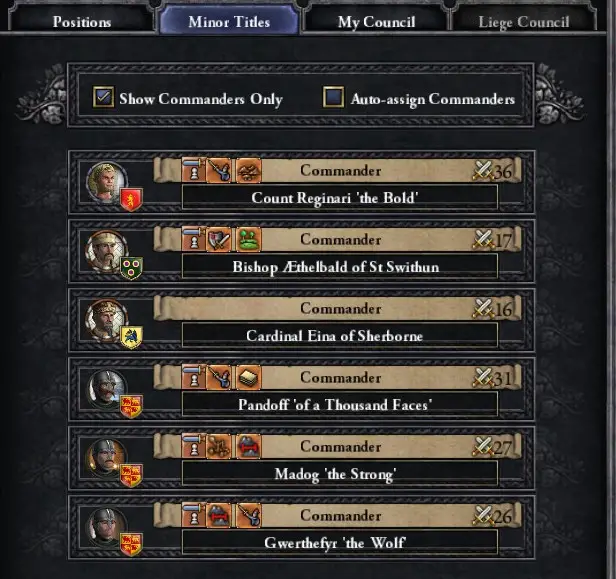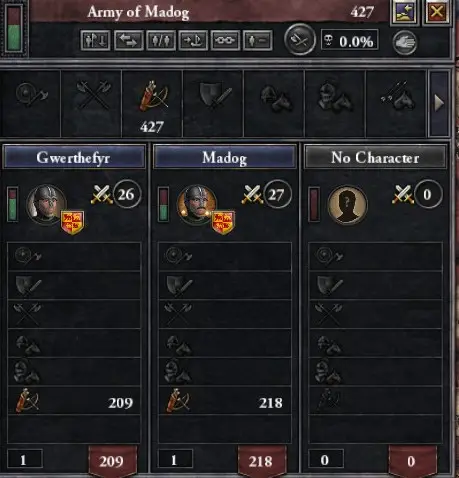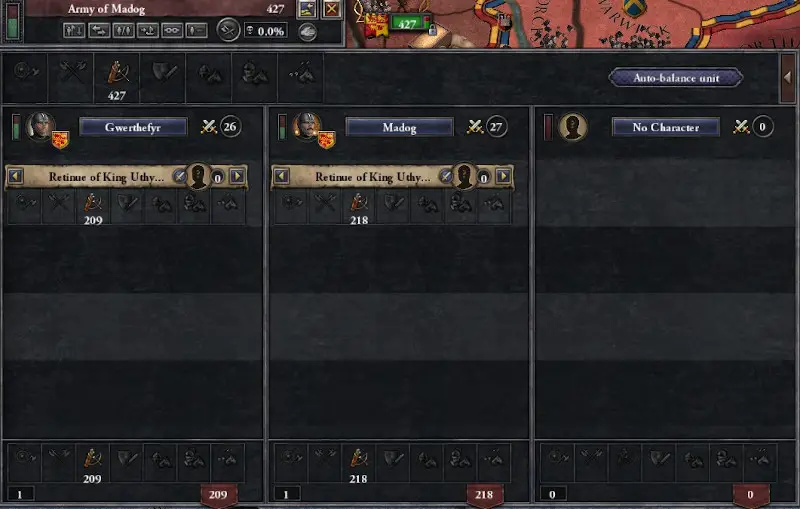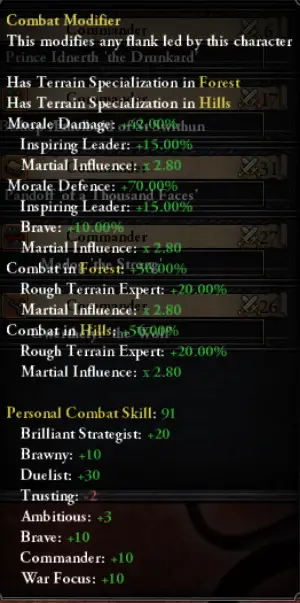Army Commanders Guide for Crusader Kings 2
Beginners Guide – ck2
The Function of Commanders
Commanders provide leadership to flanks of an army. They can increase and decrease the effectiveness of the flank they lead in battles. Outside of battles they can modify an army’s attrition, speed and effectiveness at sieges.
Appointing Commanders – The Commander Title
Before most characters can lead a flank they must hold the minor title commander set in the Minor Titles tab of the Council menu.
Setting the check box “Commanders Only” will filter out other minor titles from display. There is also a check box for auto-assigning commanders.
Characters can be assigned commander titles in the Minor Titles tab by left clicking on the name of the current title holder or “No character” for blank slots. Then selecting the desired characters portrait.
Existing commanders are displayed here with their martial skill and leadership traits. By hovering the cursor over the combat modifier icon to the left of the leadership traits a tooltip appears displaying the combat modifiers, their strength due to martial and personal combat skill.

Characters can also be relieved and appointed through the character interaction menu opened by right clicking on the character’s portrait if they are eligible.
Unlike other minor titles there is no opinion penalty for relieving a character of his commander title. The recipient of a commander title will have +5 opinion for his employer while he has the title and receives a salary and a bonus to his monthly prestige.
Marshals and the army’s employer do not need the commander title to lead flanks. The marshal may not lead troops and perform council jobs at the same time. This also true of other council members. To ensure availability of your commanders it is best not make council members commanders.
Rulers that join their army grant a morale bonus to it.
A character will also be unable to do some actions while leading troops. Eg: characters can not Go into Hiding while leading troops.
Number of Commander Titles
The number of commander titles available depend on the rank of the ruler.
Barons have one, counts have two, dukes have four, kings have six and emperors have eight.
Controlled Mercenaries and Holy Orders will make commanders from their
court available also.
Assigning Commanders to Flanks
Available and eligible commanders are randomly assigned to flanks of controlled armies when they are raised.
They can be deliberately assigned to flanks by left clicking on the controlled army to bring up its army control panel. Then commanders can be selected by left clicking the name / no character bar for each flank. This brings up a context sensitive character finder menu from which flank leaders can be selected.

Note this control panel is only available to armies when they are not fighting in a battle.
Assigning Commanders to Battalions
Opening the Reorganization Window allows commanders to be assigned to particular battalions as well. Only demesne levies and retinues can take a commander this way. Extra commanders placed in battalions will step up to lead a flank should the flank commander fall.

Best Characters for Commanders
Attributes
The only attribute that matters for commanders is the martial attribute.

The higher a flank commander’s martial attribute is the stronger the positive combat modifiers affecting his flank will be and the weaker will be the penalties.
The relevant combat modifiers can be seen in the tool tip when hovering over this icon  on the commanders character card.
on the commanders character card.

Commanders with a martial attribute of less than 8 will probably make a flank perform worse than if it had no commander at all.
The martial attribute can affect some battlefield events such as the dueling of enemy commanders. However the Holy Fury DLC and the associated free patch have shifted that influence to the personal combat skill.
Traits
There are very many traits that a commander may have that will have an effect on the performance of his flank in battle. In general you are looking for traits that have a positive effect on damage, defense, morale damage, morale defense, pursuit and flanking.
Also helpful are traits which unlock good tactics. More situational are traits which provide bonuses in certain contexts like terrain bonuses or only to particular troop types.
Brave is solid trait for a commander for its bonus to moral defense and unlocking of the Heroic Countercharge tactic. Cruel and Zealous may also have some use.
There are some traits that will have a negative effects. In particular avoid fielding commanders who are craven as that will adversely affect the morale of their flank.
There are some traits which unlock bad tactics. The worst two bad tactics are Hesitant Commander and Confused Orders. The former is unlocked by Slothful or Shy and the latter by Lisp or Stutter.
Given the very strong effect tactics can have on a flank’s performance these four traits, Slothful, Shy, Lisp and Stutter should be very strongly avoided.
See also Traits You Did Not Know You Wanted.
Personal Combat Skill
Following the patch for the Holy Fury DLC personal combat skill becomes important for battlefield events. Commanders with strong skill here will tend to do better at capturing enemy commanders, winning battlefield duels and surviving without injury.
Consequently ill or injured characters may be more at risk of dying during battlefield duels due to lowered personal combat skill.
Relieve of duty valuable commanders with injuries and illnesses until they recuperate.
Culture
Commanders with certain cultures have special tactics available for them.
Altaic culture group enables Retreat and Ambush Tactic which makes horse archers stronger when on flat ground. It will also flip combat back to the skirmish phase.
Arabic culture group enables Desert Ambush making all light troops stronger in deserts.
Byzantine culture group enables Embolon Charge Formation which makes cavalry stronger.
English or Welsh culture enables Massive Longbow Volley Tactic which makes archers stronger.
French, Occitan, Norman, German, or Breton culture enables Couched Lance Charge makes heavy cavalry stronger.
North Germanic culture group enables Berserker Charge which makes light and heavy infantry stronger.
Italian culture enables Pike Column Advance which makes pikemen stronger.
Tibetan culture group enables Mountain Ambush Tactic which makes light troops and heavy infantry stronger on hills and mountains.
Scottish culture enables Schiltron Formation which makes pikemen and heavy infantry stronger.
Landed Commanders
The kind of characters who make good commanders also tend to make good vassals, particularly feudal and tribal vassals. A strong martial attribute is not just effective for leading flanks it also helps boost the levy size for the holdings that the character owns. Landed commanders will also benefit from good stewardship.
Sourcing the Best Commanders
Training from Childhood
You can generate your own quality commanders through the education of the children in your court and the children of your vassals, if they will allow it.
This is a slow process and subject to the vagaries of random number generators but can produce large numbers of good commanders with tailored traits and compatible culture and religion.
To do this assign children you want to be commanders to guardians with a high martial skill and a high level martial education trait, ideally Brilliant Strategist.
The guardians do not have to be vassals or present in your realm or court.
Additionally try to choose guardians with appropriate personality traits for soldiering. Guardians tend to encourage their wards to adopt the same personality traits. Eg: If you want brave and diligent commanders try to train them to brave and diligent guardians. Avoid tutors with craven or slothful.
A more passive approach would be to make a commander trainer your Court Tutor. Then by default most children in your court will get a military training without active assignment.
Do not assign children to active duty commanders as the likelihood will be that the children’s education will be disrupted by the guardian’s death.
Also it is probable that active duty commanders do not influence the development of their wards while leading troops. Training new commanders is a job for retired commanders.
The Warrior Lodges included by the Holy Fury DLC allows the ability for members to recruit their children to the lodge. Warrior Lodges provide many additional opportunities for characters to develop martial skills and traits.
Invite to Court
You can use the character finder tool to find characters with the right qualities for making great commanders and then inviting them to your court. Set the filters for characters who will join your court and set the order by martial trait. Optionally filter for culture and religion also.
Be aware that it will usually not be possible to give women the commander title.
There are often very high quality characters outside your realm or court who will be happy to come to your court if invited (shown by the green hand icon). Others will need some bribing (yellow hand icon).
When they arrive they can be granted a commander title as with any other titles.
By Decision – Promote Commander
The Intrigue Screen has a promote commander decision which will create a randomly generated character with broadly good qualities for a commander. It will cost gold and prestige but it is quick.
By Decision – Summon Lodge Commander
If you are a member of a warrior lodge with sufficient rank then you will have an Intrigue Decision for recruiting a lodge member. This option is a stronger version of the former Promote Commander Decision which costs renown instead of gold and prestige.
Organize the Army – Marshal Job
Setting your marshal to Organize the Army will introduce a chance to create a randomly generated character with good commander qualities. It is like the Decisions above except it is free of a creation cost but unpredictable as to when it happens.
Shieldmaiden – Warrior Lodge
The Warrior Lodges introduced by the Holy Fury DLC allow members to make sisters and daughters into shieldmaidens. Shieldmaidens can be granted a commander title or given a job as marshal which are normally not available to females.
This option increases the opportunities for finding quality commanders by widening the pool of potential recruits.
Without the Holy Fury DLC only germanic pagans can make shieldmaidens.
Improving Commanders
Organize the Army – Marshal Job
The aforementioned Organize the Army job for your marshal may also periodically improve an existing commander with an increment to his martial skill or the addition of a leadership trait.
Battlefield Experience
Although participation in battles can cause death, injury or capture to your commanders it also can help increase their stats and skills.
Keeping your armies and commanders active by joining wars, raiding, fighting off raiders and uprisings can help give them opportunities to develop. Though it also introduces opportunities to become harmed.
Crusading
Commanders participating in Great Holy Wars or equivalents like Crusades and Jihads may gain the religion appropriate Crusader Trait for a significant bonus to martial skill and personal combat skill.
Teach Virtue / Spiritual Guidance – Monastic Orders
Members of monastic orders can potentially cure some commanders of bad traits for commanders like Slothful using the Spiritual Guidance interaction. Though it may also rob a commander of a vice that is probably beneficial overall to commanders such as Wroth.
Likewise Teach Virtue can potentially give good traits like Patient and Diligent to the commander.
Risks to Commanders
Commanders face the risk of injury, capture and death when leading troops in battle.
They also may contract any epidemics present in the location of their army.
Commanders may contract Scurvy if leading troops being transported by ship.
Commander Exploits and Gambits
Teleportation
Unassigned commanders can be assigned to any controlled army regardless of where it is on the map. Moreover there is no cost to resigning a commander from an army. This allows what amounts to teleportation.
Your best commanders can fight in different theatres of war providing the respective battles do not happen quite simultaneously. Likewise commanders can avoid the risk of contracting an infectious disease by simply temporarily resigning them while their troops are in a risk area.
Killing Rivals without Kinslayer or Tyranny
The extra dangers which commanders face can be used to solve some problem courtiers or vassals “by sending to the eastern front”. Make unwanted a characters into commanders then put them in charge of a very small army and send them to fight much stronger enemies.
Courtiers who die this way are not considered to have been murdered so there is no risk of tyranny or kinslayer.
Alternatively put them on a ship and leave them out to sea until scurvy kills them. This can take a long time so do not use a boat belonging to a vassal that you do not wish to annoy.